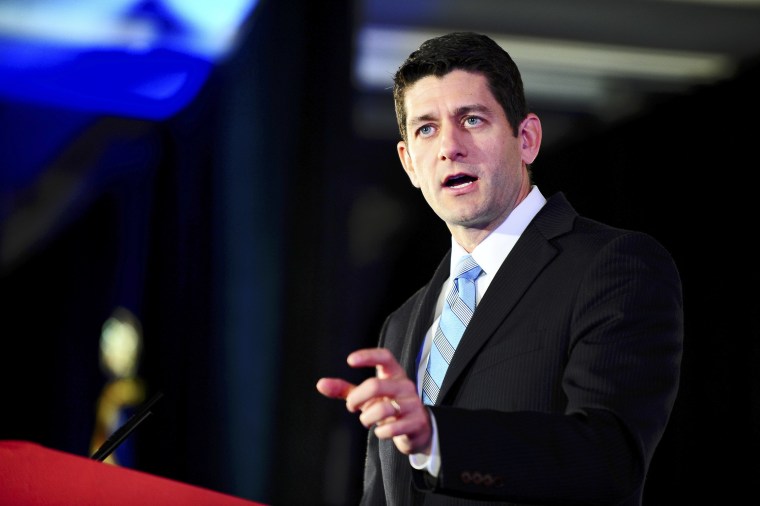Budget deficits have fallen for four years in a row, down to nearly pre-recession levels in the last fiscal year. That may mean some pressure is off the House-Senate budget conference which held its second public meeting at the Capitol Wednesday.

The committee is up against a nominal Dec. 13 deadline to agree on a budget plan for the current fiscal year and beyond. But no immediate funding halt or government shutdown would occur on that date if the panel can’t agree on a blueprint. The real deadline is Jan. 15, the date by which a new spending bill must be enacted.
House Budget Committee chairman Rep. Paul Ryan, R- Wisc., said at Wednesday’s meeting that he and Senate Budget Chairman Sen. Patty Murray have been conferring with each other privately since the budget conference committee’s last public meeting, but “we’re not there yet” on clinching a deal.
Murray confirmed this: “We have had a number of discussions since our last (public) meeting regarding the parameters of a potential deal and I’ve been very encouraged by those conversations. They are going to continue.”
It’s understood that if there’s a deal it will be Ryan and Murray who’ll have to design it. A “deal” means a budget plan that would set spending and revenue targets for the congressional spending and tax- committees to meet.
At least for now, the 27 other members of the committee are extras in this performance – although they did get to use Wednesday’s meeting to quiz the witness, Congressional Budget Office director Doug Elmendorf, about the nation’s finances.
Elmendorf had some grim reminders – federal debt will grow over the next 20 years and “debt is already larger relative to the size of the economy than at any time in our history, except for a brief period around World War II.”
And as he has often warned before, Elmendorf said “the federal budget is on an unsustainable path…. You know the main reasons: retirement of Boomers and the rising cost of health care are pushing up the costs of the largest federal programs.”
And under questioning from Sen. Tammy Baldwin, D- Wisc., he described how the very high and what he called “very worrisome” level of long-term unemployment (being without a job for at least 27 weeks) is inflicting damage to the economy, reducing potential U.S. economic output by 1.5 percent by the end of this decade. And of course, if more of these people were working, federal revenues would be higher, and deficits and future debt would be smaller.
Even if you can’t do a compromise deal, Elmendorf told committee members, it would good for the economy if you could reduce some of the uncertainty about fiscal policy in 2014.
“Small steps are better than no steps at all,” he told the committee. “Move the ball a little bit.”
And he urged committee members not to become depressed by the ugly numbers that he brought. “When I make presentations like this, I worry that can my toting up all economic and budget challenges our country faces can make the problem seem so large that it actually discourages people from acting. That would be unfortunate.”
One possibility sketched by Sen. Ron Wyden, D - Ore. at Wednesday’s meeting: a budget deal that led to closing a few tax loopholes – but not aiming to do a comprehensive redesign of the entire tax code, instead leaving that for the future. “I think it’s possible to have our feet in both camps,” Wyden told reporters after the meeting. “The reality is that tax reform is not going to be enacted in the same timetable as we’re dealing with here” in the budget conference committee. But maybe “a down payment on tax reform” is possible as one result of the Ryan-Murray negotiations.
Some Republicans see the cuts in spending, the sequester cuts, that were in the 2011 Budget Control Act as hard-won and real spending cuts, and they don’t want to give them up.
The sequester for 2014 is overall a cut of about $109 billion, or about three percent of total federal spending. But entitlement programs such as Medicaid and Social Security are mostly exempt, so the sequester is concentrated on military spending and domestic discretionary spending – items like medical research and staffing of federal agencies.
Both parties are facing pressure from their constituents to soften or cancel the sequester cuts. Republicans, for example, are increasingly at odds with their national defense constituency.
Last week before the Senate Armed Services Committee, Army Chief of Staff Gen. Raymond Odierno said the sequester “will make it very difficult to conduct even one sustained major combat operation.” The Army, he said, “scrambled in 2013 to come up with the dollars to meet our sequestration marks (and) there's things we did that, frankly, mortgaged our future.”
He said “we stopped training” soldiers and if the sequester continues, “we will not be able to train them for the mission they're going to have to do. We will have to send them without the proper training and actually maybe proper equipment that they need….” This will mean “potentially higher casualties” when the president order troops into harm’s way, he said.